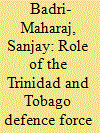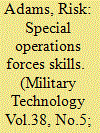|
|
|
Sort Order |
|
|
|
Items / Page
|
|
|
|
|
|
|
| Srl | Item |
| 1 |
ID:
154401


|
|
|
| 2 |
ID:
174560


|
|
|
|
|
| Summary/Abstract |
The United Nations Convention on the Rights of the Child entered into force in 1990. It condemns child marriage, violence and discrimination against children and enjoins tutelage for their education and health. Implementing such principles in national legislation sometimes conflicts with local norms relating to respect for cultural and religious traditions. This was the case of Trinidad and Tobago, a multicultural and multi-religious society that legally sanctioned child marriage until 2017. The paper makes two unique contributions to the literature. First, using the literature on child marriage and the obligations under international conventions, the paper creates a child marriage conceptual framework with the main normative positions on child marriage. Second, using the framework, it explores the normative motivations underlying the domestic legal reform debates held in parliament between 2015–2017. The paper uses the conceptual framework to explain the transformations in the traditional positions of local religious and ethnic groups, provides evidence of norm penetration from the international to a local multicultural setting and furthers the literature on international human rights norm penetration and contestation.
|
|
|
|
|
|
|
|
|
|
|
|
|
|
|
|
| 3 |
ID:
151998


|
|
|
|
|
| Summary/Abstract |
Despite a well-integrated Muslim population, and an environment where there is no tangible discrimination or lack of opportunity, the Jihadist ideology has succeeded in taking root in Trinidad. Links with organized crime have helped fuel the movement and strong links have been forged with ISIS and Al-Qaeda with the result that at least 89 Trinidadians are now in Syria. It is also argued that some Trinidadian Muslims have succumbed to the messages broadcast by ISIS and that the lure of fighting for an Islamic Caliphate has found resonance. The conclusion will show that a lack of political consensus and will has hampered the country’s ability to effectively neutralize the challenge thus posed.
|
|
|
|
|
|
|
|
|
|
|
|
|
|
|
|
| 4 |
ID:
154350


|
|
|
|
|
| Summary/Abstract |
The article examines the subject of homegrown violent extremism related to militant Islamism in the dual-Island Caribbean state of Trinidad and Tobago (T & T). It employs original research drawn from a series of semi-structured interviews and focus groups conducted between November 2015 and January 2016. Tracing the evolution of endogenous forms of radicalism and extremism the article considers how globalized-exogenous forms of militant Islamism associated with Al Qaeda and its offshoots, such as the so-called Islamic State, have impacted local patterns of violent extremism. The case study draws attention to a state and a region that have received scant attention in terrorism studies. As demonstrated by the article, this oversight is imprudent. There are a number of noteworthy findings from this case study for terrorism studies scholars: the unique historical legacy of radicalism, extremism and insurrection among T & T's Islamists; the country's markedly high levels of extremist travelers on a per capita basis and the high rate of religious converts among those travelers; the inter-linkages between criminality and political violence; and the potential threat posed by Trinidadian and Tobagonian militancy regionally.
|
|
|
|
|
|
|
|
|
|
|
|
|
|
|
|
| 5 |
ID:
088270


|
|
|
|
|
| Publication |
2009.
|
| Summary/Abstract |
Using vector autoregressive (VAR) methodology, this paper empirically investigates the macroeconomic effects of oil price fluctuations on Trinidad and Tobago. Overall, we find that the price of oil is a major determinant of economic activity of the country. Our impulse response functions suggest that following a positive oil price shock, output falls within the first two years followed by positive and growing response. We also investigate the macroeconomic impact of oil price volatility. Results suggest that an unanticipated shock to oil price volatility brings about random swings in the macroeconomy; however, only government revenue and the price level exhibit significant responses. With regard to the magnitude of the responses, shocks to oil price volatility tend to yield smaller macroeconomic impacts in comparison to shocks to oil prices. Variance decompositions suggest that the price of oil is a major component of forecast variation for most macroeconomic variables. Finally, Granger-causality tests indicate causality from oil prices to output and oil prices to government revenue.
|
|
|
|
|
|
|
|
|
|
|
|
|
|
|
|
| 6 |
ID:
110277


|
|
|
|
|
| Publication |
2012.
|
| Summary/Abstract |
A wealthy twin-island nation, Trinidad and Tobago has had few serious disasters to challenge its capacity to cope with such incidents. Although several plans for disaster management exist, these have remained largely th eoretical exercises. However, recent instances of devastating earthquakes in Haiti and Japan, with the accompanying tsunami in the latter, have prompted some steps towards an enhanced role for the Trinidad and Tobago Defence Force (TTDF) in disaster management. This paper will seek to outline the disaster management framework of Trinidad and Tobago and to highlight the role of the TTDF detailed therein. It will also give a brief outline of the practical experience of the TTDF in regional disaster management and highlight recent steps to improve capabilities. However, it will be shown that, despite these efforts, substantial capability gaps remain and limit the ability of the TTDF to perform its specified disaster management tasks.
|
|
|
|
|
|
|
|
|
|
|
|
|
|
|
|
| 7 |
ID:
132843


|
|
|
|
|
| Publication |
2014.
|
| Summary/Abstract |
Indonesia. Iraq. Malawi. Nigeria. Somalia. Thailand. Trinidad and Tobago. Tunis. Iraq? After officially exiting Iraq as a combat operation, in US Special Operations Forces (SOF) are again training their Baghdad I T: buddies. However, lacking a Status of Forces agreement, they are A doing the training in Jordan. The US recently sent "a small number" of elite soldiers to help "bolster skills in counterterrorism and special . (Loperations tactics, techniques, and procedures," an anonymous l s' American defence official has acknowledged.
|
|
|
|
|
|
|
|
|
|
|
|
|
|
|
|
| 8 |
ID:
137816


|
|
|
|
|
| Summary/Abstract |
Increased shale gas and shale oil production in the USA will affect global geopolitics and national security considerations. An influx of Qatari LNG into Europe and Asia, which is diverted from the USA, erodes the tremendous market share held by the Russian gas company Gazprom and significantly reduces its pricing power. The USA did not begin to import the quantities of LNG from countries like Qatar and Trinidad and Tobago. Those quantities have instead been redirected to other markets, including Europe. As part of the impact of the US shale revolution, Russian energy control over Europe will be greatly reduced. Russia’s power over the region will also be reduced. Russia has earned from US$42 billion to US$60 billion per year from selling gas to Europe. Fewer exports and lower prices will cut those revenues. Given the importance of oil and gas companies to Russia’s economics, it is urgent for Moscow to restrict Central Asian production and infrastructure to mainly or even exclusively Russian channels lest Russian oil and gas become less competitive due to its own high cost and wasteful monopolistic structure and dilapidated infrastructure.
|
|
|
|
|
|
|
|
|
|
|
|
|
|
|
|
|
|
|
|
|